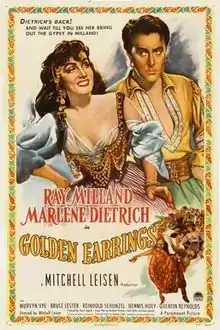Golden Earrings
Golden Earrings is a 1947 romantic spy film made by Paramount Pictures and starring Ray Milland and Marlene Dietrich. It was directed by Mitchell Leisen and produced by Harry Tugend from a screenplay by Frank Butler, Helen Deutsch and Abraham Polonsky, based on a novel by Jolán Földes. The music score was by Victor Young and the cinematography by Daniel L. Fapp.
| Golden Earrings | |
|---|---|
 | |
| Directed by | Mitchell Leisen |
| Produced by | Harry Tugend |
| Written by | Frank Butler Helen Deutsch Abraham Polonsky |
| Based on | Golden Earrings by Jolán Földes |
| Starring | Ray Milland Marlene Dietrich |
| Music by | Victor Young |
| Cinematography | Daniel L. Fapp |
| Edited by | Alma Macrorie |
| Distributed by | Paramount Pictures |
Release date |
|
Running time | 95 minutes |
| Country | United States |
| Language | English |
| Box office | $2,950,000 (US rentals)[1] |
The film's haunting song, "Golden Earrings", with a tune by Victor Young and lyrics by Ray Evans and Jay Livingston, was sung in the movie by Murvyn Vye. It was a hit recording in 1947-48 by Peggy Lee.[2]
Plot
Starting in London, England in 1946 after World War II had been declared over, at a Hotel two items were delivered: a small package for a retired British Major General Ralph Denistoun, and a telegram for an American named Quentin Reynolds. The boy who was the bellhop dropped the telegram off to Quentin Reynolds first and he then took the small package across the room to Ralph Denistoun. When Ralph saw on the box where it had come from he got behind a curtain and opened it. The package had a pair of golden earrings in it.
He then, using the window as a mirror, held one of the rings up to his pierced ears. Then when he found out that there was an airplane going from London to Paris France he got on it and was seated beside Quentin Reynolds who was also going to Paris. Quentin then asked Ralph Denistoun why has he kept the reason for his pierced ears a secret so long. Then Denistoun tells him the story of how before the war officially broke out he and another man named Richard Byrd were already in Germany and they were being held captive by a man named Hoff.
Denistroun told how they plotted to escape from Hoff and get to the home of a Professor Otto Krosigk (who had developed a special poison gas formula) who was a friend to Richard Byrd's dad. Next he told Quentin how after they escaped from Hoff that they split up and he had come across a gypsy lady named Lydia who helped him get across country with her horse and wagon by dressing him up as a gypsy so the Nazis could not recognize him. They reached the city that Denistoun was to regroup with Byrd. Instead the Germans killed Byrd after he had tried by himself to reach Professor Krosigk.
When Hoff and two of his men tried using a flame to make Byrd (who was dying) talk, Denistoun revealed himself and shot all three of the Nazis. Lydia and another Gypsy named Zoltan helped him get rid of the bodies and helped him get to Professor Krosigk's home. After some events happened when some German soldiers came to the professor's home too, the professor realized that Denistoun was telling the truth of who he was, so he gave to him the gas formula, written on a piece of German cash. Denistoun was able to get out of there with the formula and those soldiers did not know who he was.
Lydia led him to a place near a river that would allow him to swim across the water to Switzerland with the piece of paper that had the formula intact in a special container. Ralph had taken the earrings and the coat off and given them back to Lydia before he went to the High Rhine and dived into the river. So after Denistoun had reached Paris he went out to the very place where he remembered leaving Lydia several years ago, and he saw her horse Apple and her wagon. He then put the earrings back on and did the gypsy tradition of spitting three times in the river before crossing. When he got up to the wagon he calls out to Lydia and she is so excited to see him. Then when the two of them get in the wagon she puts the coat back on him and they ride off to a happy ending
Cast
- Ray Milland as Ralph Denistoun
- Marlene Dietrich as Lydia
- Murvyn Vye as Zoltan
- Bruce Lester as Richard Byrd
- Dennis Hoey as Hoff
- Quentin Reynolds as himself
- Reinhold Schünzel as Prof. Otto Krosigk
- Ivan Triesault as Maj. Reimann
- Hermine Sterler as Greta Krosigk
References
- "Top Grossers of 1947", Variety, 7 January 1948 p 63
- Gilliland, John. (197X). "Pop Chronicles 1940s Program #20 - All Tracks UNT Digital Library". Digital.library.unt.edu. Retrieved 2021-02-06.